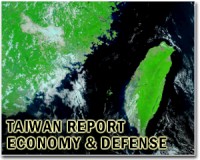 |
Taipei (AFP) April 16, 2010 President Ma Ying-jeou said Taiwan and China were at an "historic juncture" and that his engagement of Beijing through trade had put relations on their surest footing in over half a century. Shrugging off poor opinion polls and criticism that his policy amounted to appeasement that would damage the island's economy and security, Ma said Taiwan's future prosperity was inextricably linked with progress in China. But Ma cautioned the former enemies had a long way to go and warned that his government would not consider formal peace talks until China removed or dismantled more than 1,000 missiles targeting the island. "This is a very meaningful job for Taiwan at an historic juncture," the 59-year-old Harvard-trained lawyer told AFP in a wide-ranging interview half way through his first term in office. "If we can contribute to peace and prosperity across the Taiwan Straits, the accomplishments would be historic," said Ma, describing the present as the "most peaceful era in history". Taiwan, an island of 23 million people some 100 miles (160 kilometres) off the southeastern Chinese coast, has been ruled separately for over 60 years but Beijing continues to claim sovereignty and demand eventual reunification. Despite often tense relations, the past 20 years have seen massive Taiwanese investment in mainland China estimated at over 150 billion dollars and the mainland has now overtaken the United States as Taiwan's biggest export market. Ma won office in May 2008 promising to improve ties with China and boost the island's export-dependent economy after "eight lost years" under predecessor Chen Shui-bian whose pro-independence policies infuriated Beijing. Ma's administration has since signed 12 economic agreements with China paving the way for among other things increased flights and tourist arrivals, and calming one of Asia's most volatile security situations. "It's very important that the tension has been greatly reduced. In this part of the world, as you can see, there are two flashpoints -- the Korean Peninsula and the Taiwan Straits," he said. "If we can take one out of the picture, I think everyone will be happy and this is exactly what we are doing now." Ma said Taiwan had risked being left behind in an era of rapidly expanding free-trade agreements across Asia. "In the last 10 years FTAs, free-trade agreements, rose from three to 58, with the notable absence of Taiwan and North Korea," he said. To tie Taiwan into this regional network, Ma has been pushing for an agreement with China that will unlock unused potential by offering lower tariffs for a select list of industries. Ma's government hopes to sign the agreement with China in June, he said, arguing that in a time of interlinking economies and ever fiercer competition, there was no alternative. "Diplomatic isolation can be handled, and we handle it well, but with economic isolation we have to be very careful. If we lose the market share in a given country it will be very difficult to get it back," he said. "We have to move fast, we have to make sure that we will be in a position to have a level playing field with other trading partners or other competitors." Many in Taiwan fear the deal, the Economic Cooperation Framework Agreement (ECFA), will undermine the status quo with China under which Taiwan exists as a de facto independent nation but is not recognised by the United Nations. A majority of Taiwanese favour a continued status quo, with minorities supporting independence or reunification with China. Ma, who has seen his approval ratings fall below 30 percent in some polls mainly due to criticism of his China and economic policies and a perception he is not decisive enough, said the ECFA would strengthen the current status quo. "It will make the status quo more favourable to Taiwan because it will increase Taiwanese products' competitiveness in the world and will make Taiwan's status in East Asia even stronger than before." Ma said he understood nervousness in Taiwan over closer trade links at a time when his defence ministry says China is continuing to build up missiles across the Taiwan Strait. He said the missile issue impacted countries across the East Asian region but that Taiwan had not raised it in trade discussions with China. "If something is done on that, certainly it will be given a lot of importance. I think the leadership in Beijing understands that very well." He said Taiwan was watching "with concern" the human rights situation in China following deadly unrest in Tibet in 2008 and Xinjiang in 2009, the ongoing crackdown on dissent and the conflict with Internet giant Google. Ma said there were no plans to start political dialogue with China. He said the time was not right for him to consider a visit to Beijing or for Chinese Premier Wen Jiabao to come to Taiwan.
Share This Article With Planet Earth
Related Links Taiwan News at SinoDaily.com
 Protests greet new round of Taiwan-China trade talks
Protests greet new round of Taiwan-China trade talksTaoyuan, Taiwan (AFP) March 31, 2010 Taiwan and China held a new round of talks on a contentious trade pact Wednesday as protesters wary of the island's closer ties with the mainland scuffled with police and rival demonstrators. A group of about 100 anti-China demonstrators gathered as representatives of the two sides met in a hotel in Taoyuan near the island's capital, but were kept back by a cordon of uniformed police. "W ... read more |
|
| The content herein, unless otherwise known to be public domain, are Copyright 1995-2010 - SpaceDaily. AFP and UPI Wire Stories are copyright Agence France-Presse and United Press International. ESA Portal Reports are copyright European Space Agency. All NASA sourced material is public domain. Additional copyrights may apply in whole or part to other bona fide parties. Advertising does not imply endorsement,agreement or approval of any opinions, statements or information provided by SpaceDaily on any Web page published or hosted by SpaceDaily. Privacy Statement |